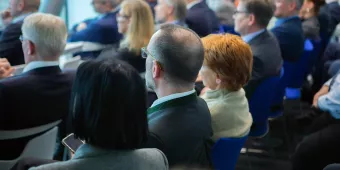Rebuilding diplomatic relationships out of the horrors of war

Rebuilding diplomatic relationships out of the horrors of war
Current geopolitics is placing great strain on relationships between the major powers. Diplomats are not immune. Following Russia’s full-scale invasion of Ukraine, many Western countries, notably France, the United Kingdom, and the United States, have effectively banned their diplomats from meeting with Russian diplomats outside of formal meetings. Inside the formal meetings, relations are antagonistic.
Ten years ago, when the United Kingdom assumed the Presidency of the UN Security Council, we faced a similarly challenging environment. Our August Presidency of 2014 came a few months after Russia’s annexation of Crimea and a mere two weeks after the shooting down of Malaysian Airlines Flight 17.
For our Presidency theme, we chose conflict prevention, with a particular focus on commemorating, and learning the lessons from, the 100th anniversary of the outbreak of the First World War. We set up an exhibition of WW1 poetry, asking all 15 Security Council Ambassadors to choose, and then record in their own language, a poem from that time. Even the embattled and defensive Russian Ambassador, the late Vitaly Churkin, embraced the spirit of the event and was particularly touched that we allowed him to pin up a picture of his uniformed grandfather in WW1 alongside the Russian poem.
That month, it so happened that a travelling troupe aiming to perform Hamlet in every country in the world came to New York. We arranged for the play to be performed at the UN. Although Churkin blocked us from using the Security Council chamber on the (debatable) grounds that it didn’t concern ‘international peace and security’, he enthusiastically attended the performance in a neighbouring room.
Despite crises in Gaza and Ukraine (another similarity with today), Mark led the Security Council Ambassadors on a trip to Belgium and the Netherlands; and to the African hotspots of South Sudan and Somalia. In Belgium, the Council visited Dinart, Leuven and Ypres, and focussed on WW1 commemorations, including laying a wreath at the Menin gate. In the Netherlands, we engaged with the key international organs of Justice – the ICJ, ICC and regional tribunals. In the course of the trip, we discussed many issues that are still highly relevant to the work of the Security Council today – protection of civilians, use of chemical weapons, accountability for war crimes, the management of refugees, destruction of cultural property and conflict prevention. At Leuven university, we even debated with academics whether the Security Council – had it existed in 1914 – might have prevented the outbreak of WW1.
Back in New York that August, we held an open debate on conflict prevention, memorable for a moving statement from French Ambassador Gérard Araud about Franco-German reconciliation following the two world wars. This was followed by the unanimous adoption of resolution 2171, which reaffirmed the Council’s, and the United Nations system’s, central role in preventing conflict.
In December that year, we returned to the theme of WW1 by organising an event to commemorate the Football Truce of Christmas 1914. At a simple ceremony on the UN lawn, the German Ambassador Harald Braun and Mark read out extracts from letters written by German and British soldiers at the front to their families back home. We sang renditions of ‘silent night’ and ‘stille nacht’. The Secretary-General Ban Ki-moon spoke about the importance of upholding humanity even in warfare, before (as a tribute to current UK/German relations) refereeing a 5v5 penalty shoot-out by 10 UN Ambassadors.
10 years on from that anniversary, the UN Security Council continues to fall short of the commitments it made in resolution 2171 to prevent future conflict. Worse than that, divisions between the 5 permanent members means that the Council cannot even bring to an end the major conflicts already raging around the world. Diplomacy is sidelined by great power ambitions. As we once more look back this month at the carnage caused by the ‘war to end all wars’, perhaps jointly commemorating the past and sharing our understanding of the horrors of war could in some small way start to rebuild those diplomatic relationships. It couldn’t be needed more right now.
Sir Mark Lyall Grant is a former National Security Adviser (2015-2017) and was the United Kingdom’s Permanent Representative to the United Nations in New York from 2009 to 2015
Simon Cleobury is Head, Arms Control and Disarmament at the Geneva Centre for Security Policy, and was a Senior Policy Adviser at the United Kingdom Mission to the United Nations from 2012 and 2016
This article was originally published on Tribune de Genève in French. The views, information and opinions expressed in this publication are the author’s/authors’ own and do not necessarily reflect those of the GCSP or the members of its Foundation Council. The GCSP is not responsible for the accuracy of the information.
